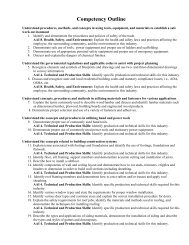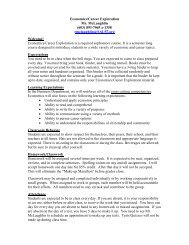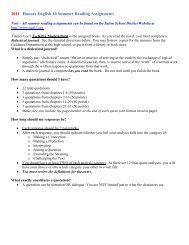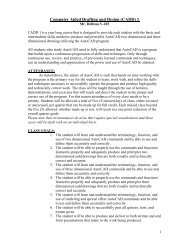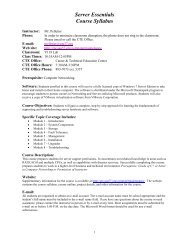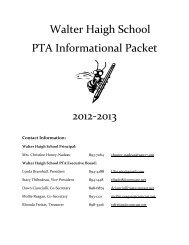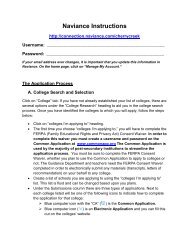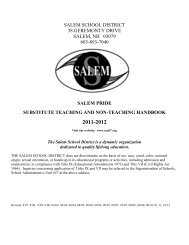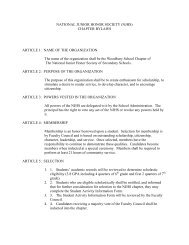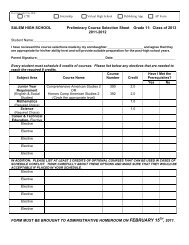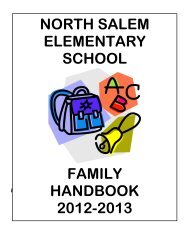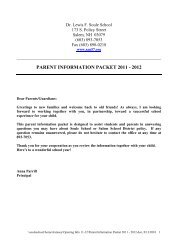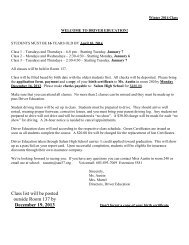Competencies (PDF)
Competencies (PDF)
Competencies (PDF)
Create successful ePaper yourself
Turn your PDF publications into a flip-book with our unique Google optimized e-Paper software.
Automotive Technology Competency Outline<br />
Understand the fundamentals of the automotive service industry<br />
1. Explain and examine the proper use of automotive chemicals and their effects.<br />
AAI 8. Health, Safety, and Environment: Explain the health and safety laws and practices<br />
affecting the employee, the surrounding community, and the environment in this industry.<br />
2. Demonstrate the proper use and care of automotive tools and equipment.<br />
AAI 4. Technical and Production Skills: Identify specific production and technical skills<br />
required for this industry.<br />
3. Demonstrate effective automotive shop management skills.<br />
AAI 1. Planning: Explain the key elements of a long-term plan for a successful company.<br />
AAI 2. Management: Discuss the different forms of management and ownership within this<br />
industry.<br />
AAI 3. Finance: Explain the key components of financial management of a company.<br />
4. Demonstrate and practice personal and automotive shop safety.<br />
AAI 9. Personal Work Habits: Explain the work habits an employer looks for in an<br />
employee in this industry.<br />
Understand and be knowledgeable in analyzing, evaluating, and detecting/repairing brake systems<br />
5. Diagnose general brake systems.<br />
AAI 4. Technical and Production Skills: Identify specific production and technical skills<br />
required for this industry.<br />
AAI 5. Underlying Principles of Technology: Explain through discussion the technological<br />
systems used within this industry.<br />
6. Diagnose and repair hydraulic brake systems.<br />
7. Diagnose and repair drum brake systems.<br />
8. Diagnose and repair disc brake systems.<br />
9. Diagnose and repair power assist unit.<br />
Understand the concepts of and procedures for investigating and analyzing electrical/electronic<br />
systems<br />
10. Diagnose and repair general electrical systems.<br />
AAI 4. Technical and Production Skills: Identify specific production and technical skills<br />
required for this industry.<br />
AAI 5. Underlying Principles of Technology: Explain through discussion the technological<br />
systems used within this industry.<br />
11. Diagnose and repair starting systems.<br />
12. Diagnose and repair lighting systems.<br />
13. Diagnose and repair battery charging systems.<br />
Understand the concepts of and procedures for investigating and analyzing steering and suspension<br />
systems<br />
14. Diagnose general automotive suspension and steering systems.<br />
AAI 4. Technical and Production Skills: Identify specific production and technical skills<br />
required for this industry.<br />
AAI 5. Underlying Principles of Technology: Explain through discussion the technological<br />
systems used within this industry.<br />
15. Diagnose and repair automotive steering systems.<br />
16. Diagnose and repair automotive front suspension systems.<br />
17. Diagnose and repair automotive rear suspension systems.<br />
18. Diagnose and adjust automotive wheel alignment.<br />
19. Diagnose and repair automotive tires and wheels.
Understand the concepts and procedures in investigating and analyzing engine performance<br />
20. Perform general engine diagnosis and repair.<br />
AAI 4. Technical and Production Skills: Identify specific production and technical skills<br />
required for this industry.<br />
AAI 5. Underlying Principles of Technology: Explain through discussion the technological<br />
systems used within this industry.<br />
21. Use scan tools to retrieve engine trouble codes and use diagnostic charts to determine cause of<br />
code.<br />
22. Perform maintenance and repair of ignition systems.<br />
23. Perform maintenance and repair of fuel, air and exhaust emissions systems.<br />
Understand the concepts of and procedures for investigating and analyzing engine repair techniques<br />
24. Perform general engine mechanical diagnosis.<br />
AAI 4. Technical and Production Skills: Identify specific production and technical skills<br />
required for this industry.<br />
AAI 5. Underlying Principles of Technology: Explain through discussion the technological<br />
systems used within this industry.<br />
25. Identify internal engine parts and systems and explain their operation.<br />
26. Perform engine diagnostic procedures including compression test, leak down test and<br />
determine engine mechanical condition.<br />
27. Perform cooling and lubrication disassembly.<br />
Understand the fundamental concepts of Entrepreneurship<br />
28. Discuss and assess venture creation possibilities and identify the steps in planning the venture.<br />
29. Identify the resources needed for venture startup and operation.<br />
30. Discuss the options in planning the venture’s future (growth, development, demise).<br />
AAI 6. Labor Issues: Explain the employees’ and employers’ rights and responsibilities in<br />
this industry.<br />
AAI 7. Community Issues: Discuss the ways a company can impact its community and the<br />
ways a community can impact a company.<br />
31. Identify and discuss the traits and behaviors of an entrepreneur (leadership, personal<br />
assessment, personal management).<br />
Understand the importance of personal growth, leadership and career success<br />
32. Demonstrate personal growth, community leadership, democratic principles and social<br />
responsibility by participating in activities/events offered through student organizations.<br />
Understand the key concepts associated with high performance/employability skills (SCANS)<br />
33. Decision-Making & Problem-Solving:Demonstrate and apply good decision-making and<br />
problem-solving skills by outlining issues in situations/problems and determining, collecting,<br />
and organizing information needed in order to formulate a solution.<br />
34. Self-Management: Demonstrate and apply self-management skills by adhering to regulations,<br />
being responsible and following through on commitments.<br />
35. Communication Skills: Demonstrate and apply effective communication skills: verbal,<br />
written, visual and listening<br />
36. Ability to Work with Others: Demonstrate and apply the necessary skills in order to work<br />
effectively with others.<br />
37. Information Use - Research, Analysis, Technology: Demonstrate and apply the use of<br />
information through research, analysis, and technology.<br />
38. Mathematical Concepts: Demonstrate mathematical and computation skills as applied to real<br />
world situations.<br />
39. General Safety: Demonstrate and apply safe practices and procedures in the workplace.<br />
40. Career Development: Demonstrate personal/career development skills by completing a career<br />
plan.



